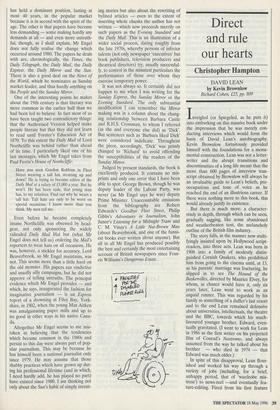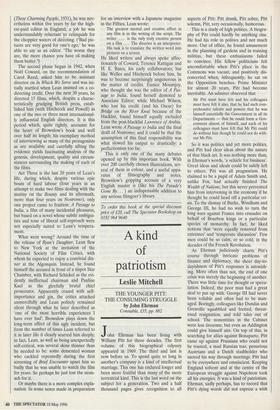Direct and rule our hearts
Christopher Hampton
DAVID LEAN by Kevin Brownlow Richard Cohen, £25, pp. 809 Inveigled (or Spiegeled, as he puts it) into embarking on this massive book under the impression that he was merely con- ducting interviews which would form the basis of David Lean's autobiography, Kevin Brownlow fortuitously provided himself with the foundations for a monu- mental construction. Lean was not a letter- writer and the abrupt transitions and discontinuities of a long life meant that the more than 600 pages of interview tran- script obtained by Brownlow will always be an invaluable guide to Lean's beliefs, pre- occupations and tone of voice as he reached the end of an illustrious career. If there were nothing more to this book, this would already justify its existence.
But there is much more: a character- study in depth, through which can be seen, gradually sagging, like some abandoned and weatherbeaten tent, the melancholy outline of the British film industry.
The story falls, in the manner now stulti- fyingly insisted upon by Hollywood script- readers, into three acts. Lean was born in 1908 into a family of modestly distin- guished Cornish Quakers, who prohibited him from going to the cinema until, at 13, as his parents' marriage was fracturing, he slipped in to see The Hound of the Baskervilles, directed by Maurice Elvey, for whom, as chance would have it, only six years later, Lean went to work as an unpaid runner. This was regarded by his family as something of a duffer's last resort and to the end Lean remained defensive about universities, intellectuals, the theatre and the BBC, towards which his much- favoured younger brother, Edward, even- tually gravitated. (I went to work for Lean in 1986 as the first writer on his projected film of Conrad's Nostromo, and always assumed from the way he talked about his brother — who died in 1974 — that Edward was much older.) In spite of this disapproval, Lean flour- ished and worked his way up through a variety of jobs (including, for a brief, unhappy period, that of 'wardrobe mis- tress') to news-reel —and eventually fea- ture-editing. Fired from his first feature (These Charming People, 1931), he was nev- ertheless within five years by far the high- est-paid editor in England, a job he was understandably reluctant to relinquish for the choppier waters of directing. (Tad pic- tures are very good for one's ego,' he was able to say as an editor. 'The worse they are, the more chance you have of making them better.')- The second phase began in 1942, when Noel Coward, on the recommendation of Carol Reed, asked him to be assistant director on In Which We Serve and was ini- tially startled when Lean insisted on a co- directing credit. Over the next 30 years, he directed 15 films, which, despite a charac- teristically grudging British press, estab- lished him (with Hitchcock and Powell) as one of the two or three most international- ly influential English directors. It is this period which, quite rightly, accounts for the heart of Brownlow's book and well over half its length; his exemplary method of interviewing as many of the protagonists as are available and carefully sifting the evidence yields fascinating analysis of the genesis, development, quality and circum- stances surrounding the making of each of the films.
Act Three is the last 20 years of Lean's life, during which, despite various epic bouts of hard labour (four years in an attempt to make two films dealing with the mutiny on the Bounty and its aftermath, more than four years on Nostromo), only one project came to fruition: A Passage to India, a film of many incidental pleasures, but based on a novel whose subtle ambigui- ties and tone of liberal self-reproach were not especially suited to Lean's tempera- ment.
What went wrong? Around the time of the release of Ryan's Daughter, Lean flew to New York at the invitation of the National Society of Film Critics, with whom he expected to enjoy a convivial din- ner at the Algonquin. Instead, he found himself the accused in front of a tinpot Star Chamber, with Richard Schickel as the evi- dently ineffectual chairman and Pauline Kael as the gleefully brutal chief prosecutor. Apparently crazed with self- importance and gin, the critics attacked unmercifully and Lean politely remained silent through what he later described as `one of the most horrible experiences I have ever had'. Brownlow plays down the long-term effect of this ugly incident, but from the number of times Lean referred to it in later life it clearly scarred him deeply; in fact, Lean, as well as being unexpectedly self-critical, was several skins thinner than he needed to be: some demented woman who cackled repeatedly during the first screening of Brief Encounter upset him so badly that he was unable to watch the film for years. So perhaps he just lost the stom- ach for it.
Or maybe there is a more complex expla- nation. In some notes made in preparation for an interview with a Japanese magazine in the Fifties, Lean wrote:
The greatest mental and creative effort in any film is in the writing of the script. The writer . . . is the only truly creative person on a film . . . The director is an interpreter. His task is to translate the written word into pictures on a screen.
He liked writers and always spoke affec- tionately of Coward, Terence Rattigan and H. E. Bates, his early collaborators; but like Welles and Hitchcock before him, he was to become surprisingly ungenerous in the matter of credits. Eunice Mountjoy, who thought she was the editor of A Pas- sage to India, found herself demoted to Associate Editor; while Michael Wilson, who lost his credit (and his Oscar) for Bridge on the River Kwai because of the blacklist, found himself equally excluded from the post-blacklist Lawrence of Arabia. Lean wrote A Passage to India and the final draft of Nostromo; and it could be that the assumption of this final responsibility was what slowed his output so drastically: a perfectionism too far.
This is only one of the many debates opened up by this important book. With over 200 carefully chosen illustrations, sev- eral of them in colour, and a useful appa- ratus of filmography and notes, Brownlow's gripping account of a very English master is (like his The Parade's Gone By. . . ) an indispensable addition to any serious filmgoer's library.
To order this book at the special discount price of £20, call The Spectator Bookshop on 0181 964 9640



































































 Previous page
Previous page